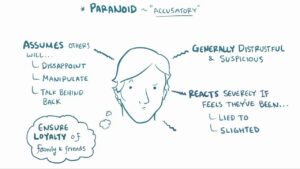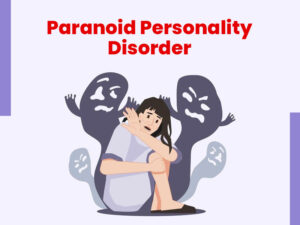Contents
- 1 What is Paranoid Personality Disorder?
- 2 Symptoms of Paranoid Personality Disorder
- 3 Types Of Paranoia Disorder
- 4 Causes of Paranoid Personality Disorder
- 5 Effects Of paranoid personality disorder
- 6 Coping with Paranoid Personality Disorder
- 7 Lifestyle Changes To Deal With Paranoia
- 8 Prevention of Paranoid Personality Disorder
- 9 Treatment for Paranoid Personality Disorder
- 10 Conclusion
- 11 A Word From Therapy Mantra
What is Paranoid Personality Disorder?

Paranoid personality disorder is a mental illness characterized by a pervasive distrust and suspicion of others. People with paranoid personality disorder often believe that others are trying to harm them or are out to get them, and they may go to great lengths to protect themselves from perceived threats.
People with this disorder may be excessively guarded and secretive, and they may have difficulty forming close relationships. They may also be quick to anger and feel slighted easily. Paranoid personality disorder can lead to a hindered quality of life, as people with this condition often experience stress and anxiety.
Symptoms of Paranoid Personality Disorder
People with paranoid personality disorder may frequently suspect others of being untrustworthy, deceitful, or manipulative. They are often on guard against other people’s perceived threats, which can lead them to question others’ behaviors and motivations.
Always Ready To Fight
 In addition, people with paranoid personality disorder may have a chip on their shoulder or be ready to fight, as they are quick to anger over perceived slights from others. They may also be clingy — feeling an excessive need for companionship from their friends and family members. This can result in strained relationships and disagreements with others.
In addition, people with paranoid personality disorder may have a chip on their shoulder or be ready to fight, as they are quick to anger over perceived slights from others. They may also be clingy — feeling an excessive need for companionship from their friends and family members. This can result in strained relationships and disagreements with others.
Difficulty Concentrating
People with paranoid personality disorder may also have difficulty concentrating, due to their constant fear of being the victim of a perceived plot against them. They are often unable to tap into their creativity and imagination, as they are constantly on the defensive. This can lead to an impaired quality of life for people with PPD, as they may struggle with mental health issues.
Suspiciousness/Aggressiveness
As a personality disorder, paranoid people are likely to be suspicious of others’ intentions. This can lead to social isolation and an almost constant fear that others are trying to harm them in some way. They may be quick to anger when they feel slighted, but if their trust is earned, they become lovingly loyal friends.
Aloofness
As a defense mechanism against the pain of being betrayed or rejected by people close to them, people with paranoid personality disorder try to keep others at an emotional distance. This can often be perceived by others as snobbishness, and results in a lack of close friendships.
Mistrust

If someone is not trustworthy in the eyes of a paranoid person, they will never trust them. Once they have decided that someone has betrayed them, they are unlikely to trust them again, even if it turns out there was good reason for the other person’s behavior.
Suspiciousness of the romantic partner’s behavior is a major symptom of this disorder. A person with paranoid personality disorder may have difficulty trusting their loved one, which can lead to regular arguments about the relationship. This mistrust can also cause problems at work if they begin to suspect their boss or co-workers motives as well.
Secretiveness
People with PPD may try to conceal their true motives or feelings because they think others will use that knowledge against them. This also leads to social isolation, as people with this disorder tend to stay away from others to avoid being exposed.
Rigidity
People with paranoid personality disorder often have very black-and-white views of the world, and are unable to comprehend ideas that don’t fit their paradigm. Their rigid mindset can make them seem opinionated or bossy to others, which will result in loss of friendships over time.
Difficulty Communicating
 Because they lack close connections with others, paranoid people may be uncomfortable discussing personal problems or feelings with anyone but their partner or closest friends. This makes it difficult to address concerns in any kind of non-threatening setting, which can reduce their quality of life by limiting opportunities for growth and development.
Because they lack close connections with others, paranoid people may be uncomfortable discussing personal problems or feelings with anyone but their partner or closest friends. This makes it difficult to address concerns in any kind of non-threatening setting, which can reduce their quality of life by limiting opportunities for growth and development.
Other Signs
Mental health professionals use the following criteria to diagnose paranoid personality disorder:
1. Suspects without sufficient reason that others are exploiting, harming, or deceiving him or her
2. Is quick to anger and is often suspicious and unfriendly
3. Reads hidden demeaning or threatening meanings into benign remarks or events
4. Persistently bears grudges, i.e., is unforgiving of insults, injuries, or slights
5. Perceives attacks on his or her character or reputation that are not apparent to others and is quick to react angrily or to counterattack
6. Is suspicious of the loyalty or trustworthiness of friends or associates
7. Keeps others at a distance out of fear that they will harm or deceive him or her
8. Shows excessive pride in work and productivity at the expense of leisure activities and friendships
9. Requires much more than the usual amount of time to complete tasks at work or at home due to suspiciousness, asthenia (fatigue), or depressiveness
10. Has recurrent fantasies of promotion or gaining power, prestige, recognition, success, advancement, authority, or control
11. Is preoccupied with unjustified doubts about the loyalty or trustworthiness of friends or associates (Criteria for this disorder are also included in DSM-5)
Types Of Paranoia Disorder

There are three types of paranoia disorder: persecutory, grandiose, and hypochondriacal.
Persecutory paranoid disorder
Persecutory paranoid disorder is the most common type, and is characterized by a persistent fear that others are out to harm the individual. This can lead to irrational thoughts and behaviors, such as constantly checking for hidden cameras or tracking devices.
Grandiose paranoid disorder
Grandiose paranoid disorder is characterized by a sense of superiority and entitlement, as well as a belief that others are coveting the individual’s possessions or status. This can often lead to aggressive behavior and social isolation.
Hypochondriacal paranoid disorder
Hypochondriacal paranoid disorder is characterized by a preoccupation with health and illness, and a belief that one is seriously ill despite medical evidence to the contrary. People with this disorder may constantly check themselves for signs of illness and have numerous visits to their doctor, but usually lack an actual medical condition.
Causes of Paranoid Personality Disorder

The cause of paranoid personality disorder is unknown, but it is thought to be the result of a combination of genetic and environmental factors. Some people with this condition may have a family history of the disorder, and it is more common in males than females. The environment may also play a role in paranoid personality disorder, as an individual’s interactions and experience within their social groups can impact the development of this illness.
Genetics: A person’s genetic makeup may play a role in this type of disorder.
Environment: A person’s environment may also contribute to the development of paranoid personality disorder, as an individual’s interactions with others are important for proper social development.
Family history: A person with a family history of paranoid personality disorder may be more likely to develop this condition.
Effects Of paranoid personality disorder
 People with paranoid personality disorder may experience a number of negative effects in their lives, due to their constant fear and suspicion of others. This condition can lead to strained relationships, as the individual with paranoid personality disorder is often quick to anger and unforgiving. They may also be clingy and feel the need for excessive companionship. People with paranoid personality disorder may also have difficulty concentrating and will have to compromise in their quality of life.
People with paranoid personality disorder may experience a number of negative effects in their lives, due to their constant fear and suspicion of others. This condition can lead to strained relationships, as the individual with paranoid personality disorder is often quick to anger and unforgiving. They may also be clingy and feel the need for excessive companionship. People with paranoid personality disorder may also have difficulty concentrating and will have to compromise in their quality of life.
Effects On Relationship
People with paranoid personality disorder may have an inability to get along with friends or family members, due to their constant fear, anger, and feelings of mistrust. They often hold grudges until they feel that their questions about others’ loyalty are answered. This can lead to arguments and disagreements in relationships.
Effects On Work Life
Individuals with paranoid personality disorder may also have difficulty concentrating and focusing on the task at hand, due to their constant fear of exploitation or deceiving by others. This can result in poor work performance and low productivity. Someone with such disorder may be overly preoccupied with work efficiency. It can lead to neglecting personal connections or relationships that are important for mental health.
Effects On Physical Health
There are no specific physical health effects with paranoid personality disorder. However, it does cause impairment in quality of life. This can lead to weight gain or loss, fatigue, and other health issues due to the chronic stress experience.
Effects On Mental Health
Paranoid personality disorder can also have an effect on mental health. There are two common types of paranoia–Persecutory and Grandiose. Individuals with persecutory paranoia feel that they are being watched, controlled, or taken advantage of by others. They may also feel that others seek to hurt them in some way.
Coping with Paranoid Personality Disorder

People with paranoid personality disorder are at an increased risk of experiencing depression, anxiety, stress, and other mental health conditions. It is important to seek treatment for this condition in order to cope with the symptoms of this disorder. As it may impact an individual’s quality of life, it is important to seek out coping mechanisms for this condition.
- Social skills training
- Cognitive behavioral therapy (to help individuals with their thought patterns and behaviors)
- Alternative therapies such as art therapy, music therapy, and dance therapy
Lifestyle Changes To Deal With Paranoia
There are a few lifestyle changes that can be helpful in order to deal with paranoia.
- First, it is important to seek treatment for paranoid personality disorder. This will help to reduce the symptoms of paranoia and improve quality of life.
- Second, it is important to stay social and connected with others. This is easily possible through social skills training, family therapy, or supportive psychotherapy.
- Third, it is important to stay active and productive. You can stay active by participating in leisure activities and friendships.
- Finally, it is important to practice stress-management techniques. A person can try through relaxation techniques such as yoga or meditation, journaling, or talking to a therapist.
Prevention of Paranoid Personality Disorder

Because there are no known methods to prevent the disorder, individuals can take steps to protect themselves from developing this condition. Individuals can take steps to prevent the development of paranoid personality disorder, such as:
- Engaging in healthy lifestyle choices
- Seeking treatment early to manage symptoms of this disorder to prevent further development of this condition
- Seeking help if family members are exhibiting symptoms of PPD; this may increase the likelihood that the individual will develop this condition.
As there are no known methods of preventing paranoid disorder. But individuals can help protect themselves from developing this disorder by engaging in healthy lifestyle choices.
Treatment for Paranoid Personality Disorder

As paranoid personality disorder typically begins in early adulthood, it is important to seek treatment before the condition worsens. Treatment options include:
- Medications (antipsychotic medications): may help reduce suspiciousness and irritability, anxiety, and anger
- Cognitive behavioral therapy: may help people with paranoid personality disorder identify triggers for their suspicious thoughts and change their response to these triggers
- Supportive psychotherapy: may also be helpful in teaching people with this condition how to improve their relationships and work or school performance
- Family therapy (if socialization with those in the individual’s family may be impacting their development of this condition, they can seek treatment through family therapy as well)
Conclusion
Paranoid personality disorder is a mental health condition that causes extreme distrust of others. The sufferer may believe that someone is persecuting, or even plotting against them. And this can lead to symptoms like anxiety disorders and depression as well as physical ailments. Such as headaches or stomach issues. If you feel that you are experiencing these symptoms, it’s best to see your doctor for diagnosis.
A Word From Therapy Mantra
Your mental health — Your psychological, emotional, and social well-being — has an impact on every aspect of your life. Positive mental health essentially allows you to effectively deal with life’s everyday challenges.
At Therapy Mantra, we have a team of therapists who provide affordable online therapy to assist you with issues such as depression, anxiety, stress, workplace Issues, addiction, relationship, OCD, LGBTQ, and PTSD. You can book a free therapy or download our free Android or iOS app.


